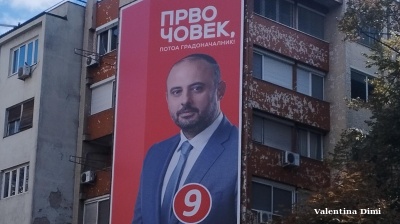Macedonian President Gjorge Ivanov handed the mandate to form a new government to Nikola Gruevski, leader of the conservative VMRO-DPMNE party, on January 9.
The nomination was expected after the party narrowly won the December 11 snap election, as under the Macedonian constitution the party with the largest number of votes should receive the mandate. However, it is not clear whether VMRO-DPMNE’s long-term coalition partner, the Democratic Union for Integration (DUI), will agree to join it in a new government. If Gruevski fails to form the new government, then the mandate will be given to the leader of the opposition Social Democratic Union of Macedonia (SDSM).
Gruevski, whose party has governed since 2006, will have 20 days to compose the new cabinet, the president’s office said in a January 9 statement. The party will likely negotiate with the DUI.
The former prime minister received the mandate two days after three ethnic Albanian parties including the DUI adopted a joint platform asking for more rights as a prerequisite for their participation in the new coalition government.
Gruevski stepped down as prime minister in early 2016 after enormous pressure by the opposition. This followed the leaking of illegally wiretapped conversations implicating Gruevski and other high-ranking officials in corrupt activities. It was also revealed that over 20,000 people including politicians, diplomats and journalists had been wiretapped.
The December 11 election was aimed at solving the long-standing political crisis in the country, but it seems that in situation when there is not a clear winner, it could result in an escalation of instability. The win for VMRO-DPMNE means that opposition frustration with their inability to oust the party from office will continue.
In the election, VMRO-DPMNE gained 51 seats, just two more seats than the SDSM. The other 20 seats were won by four ethnic Albanian parties.
The election did, however, result in an increase in support for the SDSM, including more votes from Macedonia’s ethnic Albanian minority at the expense of some of the Albanian parties.
DUI, the largest party from the ethnic Albanian bloc gained 10 seats in the new parliament, with its support almost halved since the previous elections. Newly established Besa won five seats and the Alliance for Albanians three. The Democratic Party of Albanians (DPA) won only two seats. The DPA did not sign the platform, but its leader Menduh Thaci previously said that his two MPs will support Besa.
One of the main demands of the three ethnic Albanian parties concerns the use of the Albanian language within Macedonia. The ethnic Albanian parties want Albanian to be used as an official language at all levels of government on the whole territory on Macedonia.
Gruevski told daily Dnevnik in an interview published on January 9, before he was given the mandate, that he was ready to form the new government but not at any price.
After Gruevski received the mandate, the Alliance for Albanians and Besa parties said they would not be a part of discussions with Gruevski on forming new government because he is under investigation by the Special Prosecution Office (SPO). The SPO probes crimes among high-ranking officials.
There was no reaction from the SDSM after Ivanov gave the mandate to Gruevski. SDSM’s leader Zoran Zaev has repeatedly said that his party, and not VMRO-DPMNE, will form the new government. Although VMRO-DPMNE now has the mandate from Ivanov, SDSM may find it easier to find common ground with the Albanian parties, having reached out to Macedonia’s Albanian population during its election campaign.
Some analysts do not expect the formation of stable government, instead anticipating another snap election to be held this year.
News

Putin's meeting with Trump in Budapest is a slap in the face for the EU
As preparations get underway for a highly anticipated summit between Russian President Vladimir Putin and former US President Donald Trump in Budapest, attention is turning to an unusual but politically sensitive detail: how will Putin get there?

Zelenskiy leaves Washington empty handed, Trump and Putin head to Budapest to talk business
Ukrainian President Volodymyr Zelenskiy went into a White House meeting with US President Donald Trump on October 17 hoping for a big arms deal. He came out of the meeting empty handed.

Taiwan’s KMT elects new leader
Cheng Li-wun, the only female contender among six candidates, defeated former Taipei mayor Hau Lung‑bin by a wide margin, winning over 50% of the ballot in the leadership race for Taiwan’s opposition Kuomintang on October 18.

Gold price in Sri Lanka plunges
The sudden drop of around LKR20,000 in both 22- and 24-carat sovereigns adds to a volatile recent run for precious-metals pricing in the island nation: only days earlier, gold prices were noted to be climbing.




